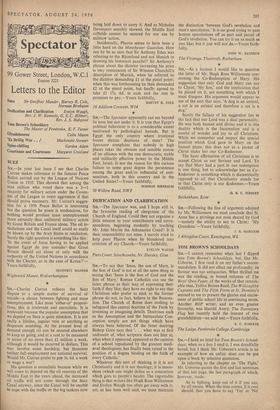SIR,—Charles Curran reduces the Suez dispute to a simple matter
of survival or suicide—a choice between fighting and mass unemployment. Like most 'either-or' proposi- tions, this is irrelevant and unrealistic. It is irrelevant because the popular assumption that we depend on Suez is quite mistaken. It is not really a lifeline, jugular vein or anything so desperate sounding. At the present level of demand enough oil can be secured elsewhere to keep us going, and at a cost to be measured in terms of no more than £1 million a week, although it would be incurred in dollars. This May involve some hardship, but threatens neither full employment nor national survival. Would Mr. Curran prefer to pay Is. 6d. a week or wage a war?
His question is unrealistic because while we will come to depend on the oil reserves of the Middle East in the years ahead, the increased oil traffic will not come through the Suez Canal anyway, since the Canal will be unable to cope with the traffic or the big tankers now being laid down to carry it. And as Nicholas Davenport sensibly showed, the Middle East oilfields cannot be secured for our use by military action.
Incidentally, Pharos seems to have been a little hard on the Manchester Guardian. How can he be so sure that Sir Anthony Eden was referring to the Rhineland and not Munich in drawing his historical parallel? Sir Anthony's phrase about the dictator increasing his price is very reminiscent of Sir Winston Churchill's description of Munich, when he referred to the dictator demanding £1 at the pistol point; when this was forthcoming he then demanded £2 at the pistol point, but finally agreed to take £1 17s. 6d. in cash and the rest in promises to pay.—Yours faithfully,
16 Addison Crescent, W14
HARVEY R. COLE


























 Previous page
Previous page